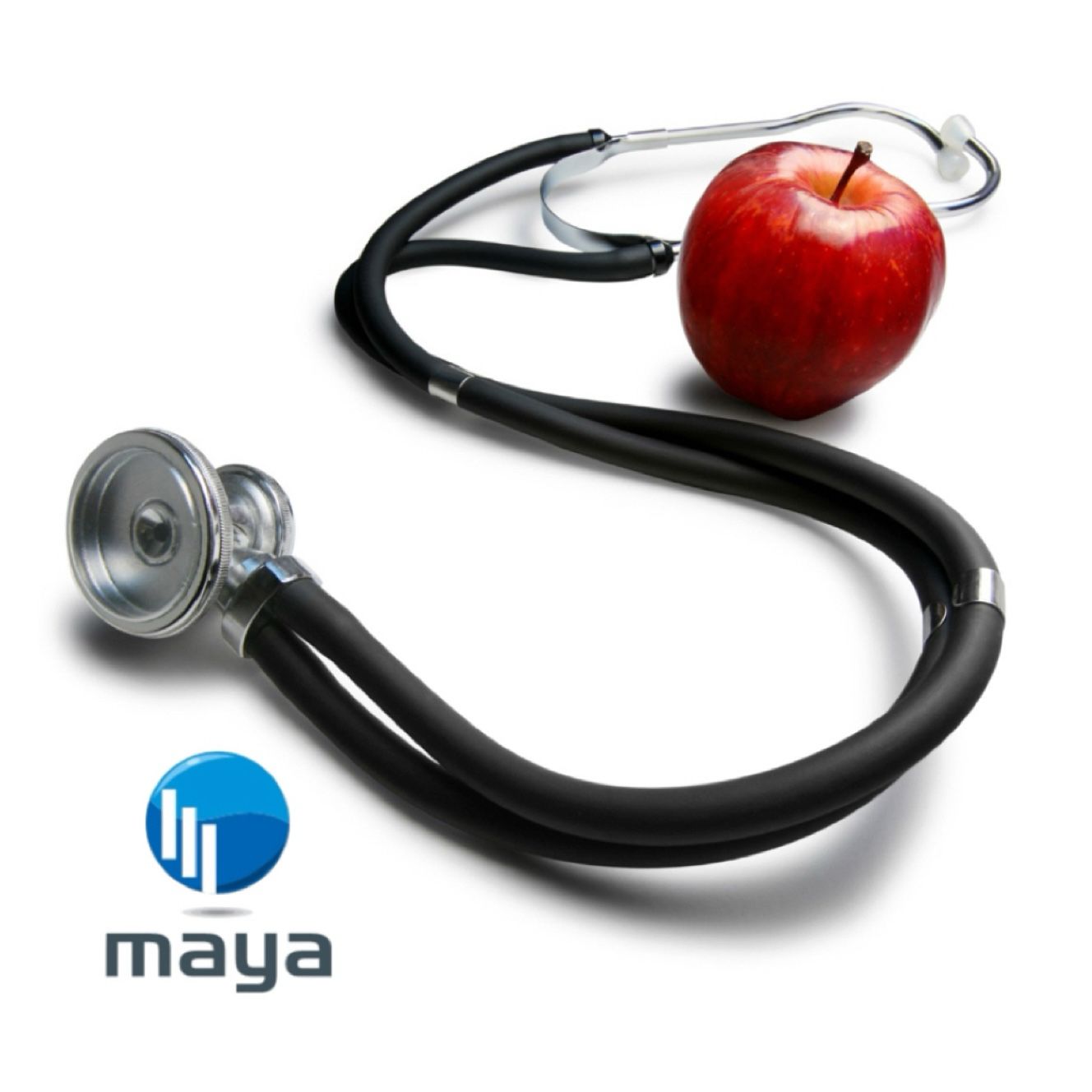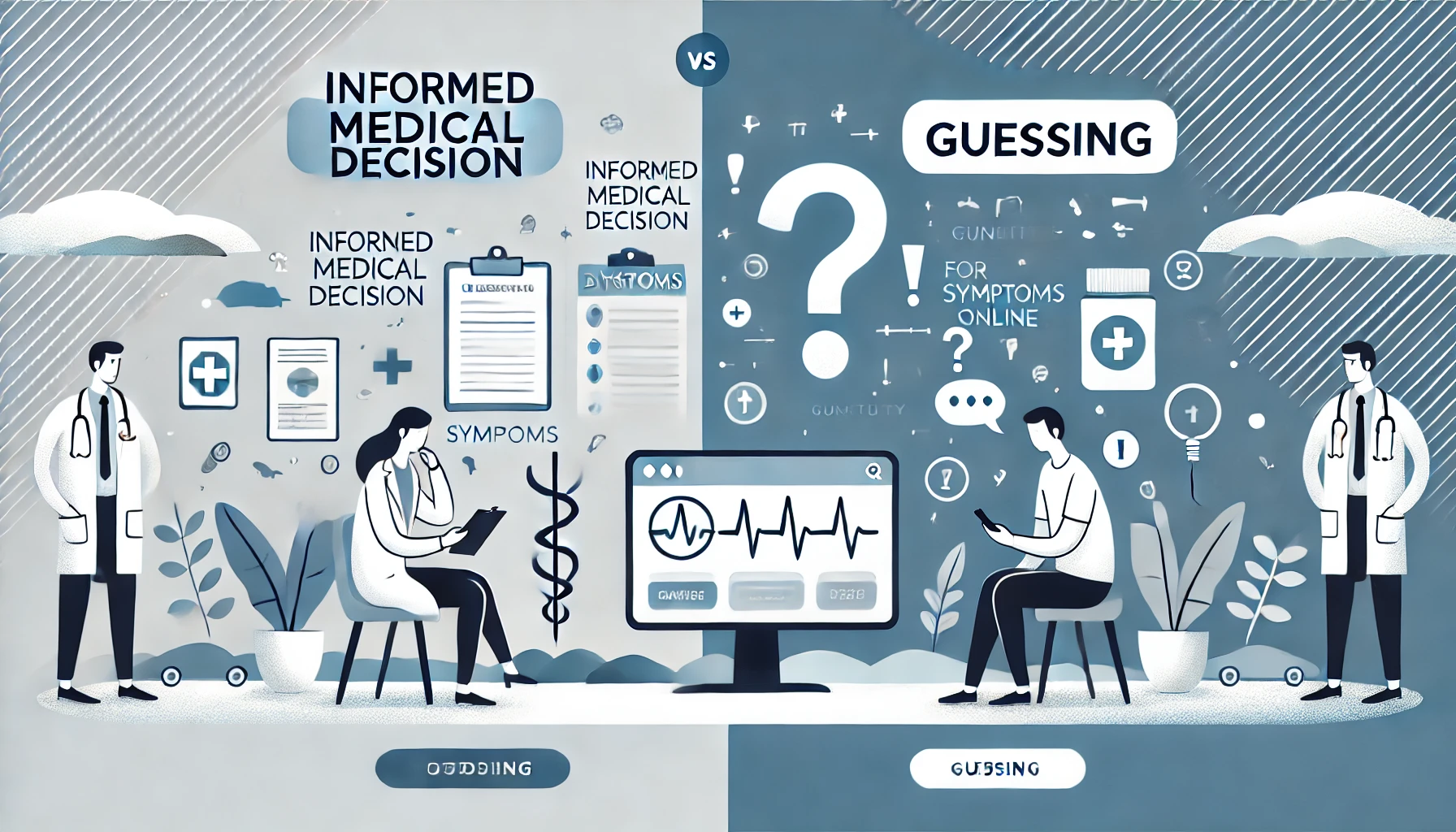Key Differences
Making decisions is a part of daily life, but the approach we take—whether based on informed decision-making or guesswork—can lead to vastly different outcomes. Here's a breakdown of what sets these two approaches apart:
1. Basis of Decision-Making
Informed Decision:
- Relies on facts, evidence, and analysis.
- Decisions are guided by available information, research, and expertise.
- Example: A person experiencing symptoms of an illness consults a reliable health tool or medical professional, considers their history, and makes a choice about seeking care based on that information.
Guesswork:
- Relies on hunches, assumptions, or incomplete information.
- Decisions are made without a solid foundation of evidence or proper understanding.
- Example: A person with symptoms self-diagnoses based on vague internet searches or anecdotal advice, potentially leading to incorrect actions.
2. Accuracy and Reliability
Informed Decision:
- Highly accurate because it incorporates verified data and critical thinking.
- Offers consistent outcomes, as it is rooted in systematic evaluation and reliable knowledge sources.
- Example: Choosing a medication after reading its scientific backing or consulting a professional ensures proper treatment.
Guesswork:
- Less accurate and often inconsistent because it lacks a structured approach.
- Outcomes are unpredictable and prone to error.
- Example: Guessing the seriousness of a medical symptom based on personal feelings can lead to unnecessary panic or delayed treatment.
3. Risk of Errors
Informed Decision:
- Minimizes the risk of errors by evaluating risks, benefits, and alternatives.
- Uses logic and evidence to anticipate potential problems and avoid them.
- Example: A company launching a product conducts market research to reduce the risk of failure.
Guesswork:
- Increases the risk of mistakes because it does not account for unknowns or complexities.
- Often leads to avoidable problems or failures due to lack of preparation.
- Example: Choosing a random investment without understanding market trends may result in financial losses.
4. Emotional Impact
Informed Decision:
- Provides a sense of confidence and control because the decision-maker understands the rationale behind their choice.
- Reduces fear, anxiety, and second-guessing.
- Example: A patient who understands the reason for a diagnosis and treatment plan feels reassured and empowered.
Guesswork:
- Can lead to doubt, regret, or stress because of the uncertainty surrounding the decision.
- May exacerbate fear or panic due to a lack of clarity.
- Example: Taking a wild guess about the cause of a symptom can lead to unnecessary worry or missed opportunities for treatment.
5. Approach to Uncertainty
Informed Decision:
- Acknowledges uncertainties but works to reduce them through research, expert consultation, and analysis.
- Decisions are adaptive, allowing for adjustments as new information becomes available.
- Example: A person uses Dr. Maya GPT to evaluate symptoms, consider potential risks, and seek appropriate medical care.
Guesswork:
- Often ignores uncertainties or oversimplifies them, leading to rash or uninformed actions.
- Decisions lack adaptability because they are based on limited understanding.
- Example: Self-treating symptoms with home remedies without understanding the underlying cause.
6. Long-Term Outcomes
Informed Decision:
- More likely to lead to positive outcomes due to its systematic and evidence-based nature.
- Promotes learning and better future decision-making as individuals understand the factors involved.
- Example: Carefully considering financial options results in sustainable, long-term success.
Here’s a table highlighting the key differences between Informed Decision and Guesswork for easy comparison:
Aspect Informed DecisionGuesswork
| Basis of Decision | Relies on facts, evidence, research, and analysis. | Relies on hunches, assumptions, or incomplete information. |
| Accuracy | Highly accurate, as decisions are based on verified data and critical thinking. | Less accurate, prone to errors due to lack of structured analysis. |
| Risk of Errors | Minimizes errors by evaluating risks, benefits, and alternatives. | Increases errors because it doesn’t account for complexities or unknowns. |
| Emotional Impact | Provides confidence and reassurance through clear understanding of choices. | Leads to doubt, regret, or anxiety due to uncertainty and lack of clarity. |
| Approach to Uncertainty | Acknowledges uncertainty and works to reduce it through analysis and expert input. | Oversimplifies or ignores uncertainties, resulting in rash or uninformed actions. |
| Consistency | Delivers consistent outcomes because of systematic evaluation. | Outcomes are inconsistent and unpredictable. |
| Adaptability | Adaptive to new information, allowing decisions to evolve as more data is available. | Static; decisions are often inflexible and based on limited understanding. |
| Long-Term Outcomes | Leads to sustainable, positive outcomes through careful consideration. | Often results in short-term fixes, requiring corrections or additional efforts later. |
| Learning Opportunity | Promotes learning and better future decisions by understanding decision factors. | Does not encourage learning; decisions are random and lack structure. |
| Example (Healthcare) | Using a reliable system like Dr. Maya GPT to evaluate symptoms and seek appropriate care. | Self-diagnosing symptoms based on anecdotal advice or unverified internet searches. |
| Example (Finance) | Researching investment options thoroughly before committing funds. | Investing in stocks based on hearsay without proper market analysis. |
This table makes it clear that informed decision-making is structured, reliable, and empowering, while guesswork is prone to uncertainty, errors, and negative outcomes.
Guesswork:
- Outcomes are often short-term and may require additional corrective actions, wasting time and resources.
- Does not contribute to learning, as the decision-making process is random.
- Example: Guessing a solution to a car problem without consulting a mechanic can lead to further damage.
Conclusion
The fundamental difference between informed decision-making and guesswork lies in the use of evidence, analysis, and understanding versus assumptions, randomness, and lack of preparation.
- Informed decisions empower individuals by providing clarity, reducing risks, and fostering trust in outcomes.
- Guesswork, while quicker and easier, often leads to errors, uncertainty, and negative consequences.
Choosing informed decision-making, whether in healthcare, personal life, or professional settings, ensures better results, greater confidence, and long-term success.

